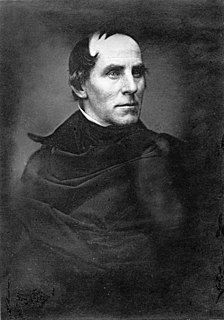A Quote by Thomas Cole
Overall, rocks, wood and water, brooded the spirit of repose, and the silent energy of nature stirred the soul to its innermost depths.
Related Quotes
... these three witnesses are one, as John said: 'The water, the blood, and the Spirit' (I Jn. 5:8). One in the mystery, not in nature. The water, then, is a witness of burial, the blood is a witness of death, the Spirit is a witness of life. If, then, there be any grace in the water, it is not from the nature of water, but from the presence of the Holy Spirit.
Man is not by any means of fixed and enduring form (this, in spite of suspicions to the contrary on the part of their wise men, was the ideal of the ancients). He is nothing else than the narrow and perilous bridge between nature and spirit. His innermost destiny drives him on to the spirit and to God. His innermost longing draws him back to nature, the mother. Between the two forces his life hangs tremulous and irresolute.
Is there in painting an effect which arises from the being together of repose and energy in the artist's mind? - can both repose and energy be seen in a painting's line and color, plane and volume, surface and depth, detail and composition? - and is the true effect of a good painting on the spectator one that makes at once for repose and energy, calmness and intensity, serenity and stir?
In Canada, when we speak of water, we're speaking of ourselves. Canadians are known to be unextravagant, and one explanation of this might be that we know that wasted water means a diminished collective soul; polluted waters mean a sickened soul. Water is the basis of our self-identity, and when we dream of canoes and thunderstorms and streams and even snowballs, we're dreaming about our innermost selves.
We must become so alone, so utterly alone, that we withdraw into our innermost self. It is a way of bitter suffering. But then our solitude is overcome, we are no longer alone, for we find that our innermost self is the spirit, that it is God, the indivisible. And suddenly we find ourselves in the midst of the world, yet undisturbed by its multiplicity, for our innermost soul we know ourselves to be one with all being.
The repose necessary to all beauty is repose, not of inanition, nor of luxury, nor of irresolution, but the repose of magnificent energy and being; in action, the calmness of trust and determination; in rest, the consciousness of duty accomplished and of victory won; and this repose and this felicity can take place as well in the midst of trial and tempest, as beside the waters of comfort.
As the smallest drop of water detached from the ocean contains all the qualities of the ocean, so man, detached in consciousness from the Infinite, contains within him its likeness; and as the drop of water must, by the law of its nature, ultimately find its way back to the ocean and lose itself in its silent depths, so must man, by the unfailing law of his nature, at last return to his source, and lose himself in the great ocean of the Infinite.





































